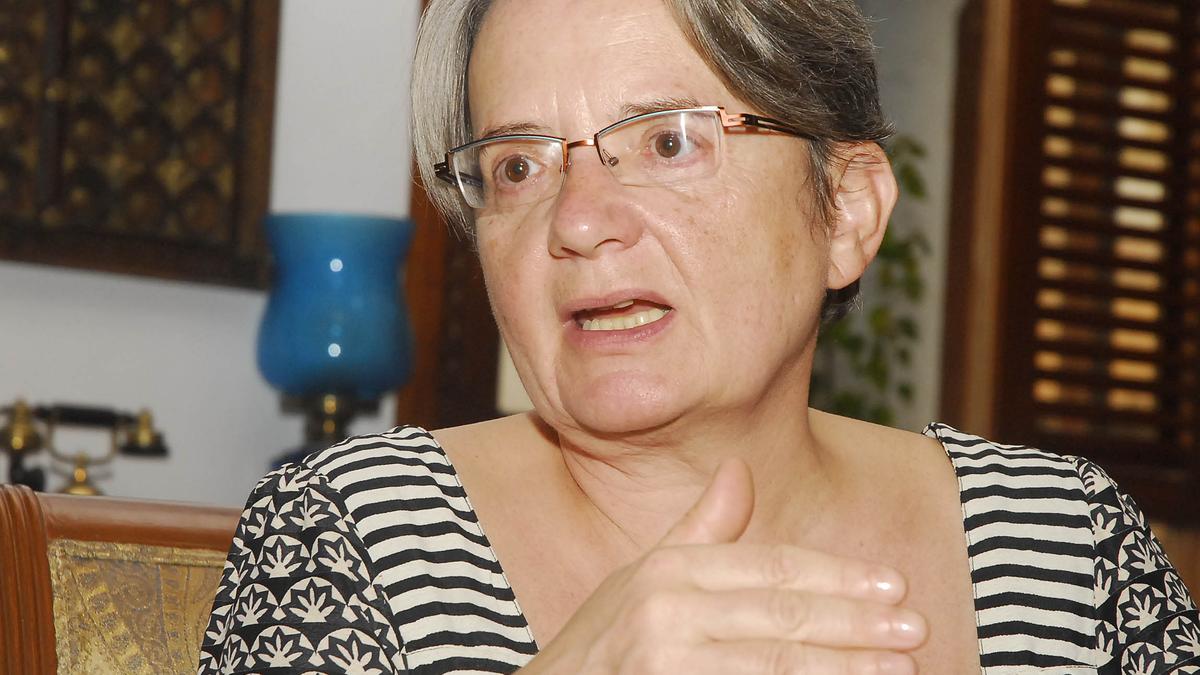File photo of Agnieszka Holland.
| Photo Credit: The Hindu
“Franz Kafka is a parable interpreted and realised in different ways,” said Agnieszka Holland, the grand dame of Polish cinema, whose spirited biopic of one of the most influential and enigmatic figures is making waves on the festival circuit.
Echoing Kafka’s concerns about faith and doubt, the biopic seeks to separate the brand Kafka from Franz, whose prophetic depiction of a penal colony and a totalitarian future, written almost two decades before the gas chambers became a reality, has once again become relatable.
Speaking to The Hindu on the sidelines of a press conference at the 50th Polish Film Festival, where Franz, Poland’s official entry for the 98th Academy Awards, is a leading contender for the top prize, Ms. Holland, 74, said the world was grappling with several wars.
“We are losing the common ground that we believed we had found after the Second World War. The ground that we built together. Though our trust was shaken by imperialist and totalitarian regimes, injustice, and inequality, there was still a ground that we believed was a starting point to build on. But now I am under the impression that we no longer have that ground,” she said.
Reflecting on the film’s most meaningful and mysterious line, where Kafka says impatience and indifference made us lose paradise, Ms. Holland, describing the expression as the wisest in the film, echoed, “Two main sins of humanity were impatience and indifference.”
Asked if the reference to paradise was politically coded in relation to the Israel-Palestine conflict, Ms. Holland, born to a Jewish father and a Catholic mother and who spent her formative years in Prague, said she identified with Kafka’s dilemmas and projected herself onto him.
“Identity is a trap we glue to. There are periods when we believe that the true nature of a human being is not connected to the colour of their skin, language, or religion. But then comes a moment when the people become so lost in the wars that they start believing their own identity and reality are right, and no other reality has the right to exist or even coexist. That is a dangerous moment, and I feel we are at that point now.”
She added, “The world is being ruled by monsters. Do you want me to name them?”
Ms. Holland said she tells her Jewish and Polish communities things she is not proud of. “The question is whether their identity is the main guilt or if the fear of losing their identity is the main guilt.”
A celebration of contemporary and classic Polish cinema, the Main Competition, featuring 16 titles, also showcased Michał Kwieciński’s Chopin Chopin!, a playful biopic tracing the life of the legendary Polish pianist for the social media generation. Other engaging titles included Piotr Domalewski’s The Altar Boys, Kordian Kądziela’s Larp, Wojciech Smarzowski’s Home Sweet Home, and Maciej Sobieszczański’s Brother.
A light-hearted story of teenage boys questioning the hypocrisy of priests and offering their own alternative for moral rejuvenation, The Altar Boys is seen as a popular choice in the competition for balancing arthouse and commercial appeal.
Artistic director Joanna Łapińska said, “We are closing the festival’s half-century with an exceptionally diverse set of films. Polish cinema is going through a phase where Poles are not attending theatres enough to watch films. So, the idea is to strike a balance between our art house cinema and the new, more commercial wave. We have big names, titles that have already made a name for themselves, and our discoveries from this year. I see this as an interesting starting point for a conversation about Polish cinema and its future.”
(The writer is in Gdynia at the invitation of the Polish Film Festival and the Polish Institute in New Delhi.)
Published – September 27, 2025 04:57 pm IST

